- Clone
- 6588-5 (See other available formats)
- Regulatory Status
- RUO
- Other Names
- GPR-2, C-C chemokine receptor 10
- Isotype
- Armenian Hamster IgG
- Ave. Rating
- Submit a Review
- Product Citations
- publications
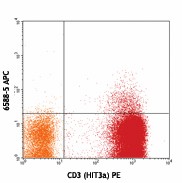
-

Human peripheral blood lymphocytes stained with 6588-5 APC and CD3 (HIT3a) PE
| Cat # | Size | Price | Quantity Check Availability | Save | ||
|---|---|---|---|---|---|---|
| 341505 | 25 tests | 143€ | ||||
| 341506 | 100 tests | 323€ | ||||
CCR10, also known as GPR-2, is a G-protein-coupled seven transmembrane CC-chemokine receptor. It is the receptor of CCL27 (CTACK/ALP/ILC/ESkine) and CCL28 (MEC) and is expressed on a small subset of T memory cells, IgA-secreting cells, EBV-immortalized B cells, dermal microvascular endothelial cells and dermal fibroblasts. The interaction of CCR10 with its ligands plays a role in the regulation of T cell homing into cutaneous site and IgA-secreting cells migration.
Product DetailsProduct Details
- Verified Reactivity
- Human
- Reported Reactivity
- African Green, Baboon, Cynomolgus, Rhesus
- Antibody Type
- Monoclonal
- Host Species
- Armenian Hamster
- Immunogen
- N-terminal peptide of human CCR10
- Formulation
- Phosphate-buffered solution, pH 7.2, containing 0.09% sodium azide and BSA (origin USA)
- Preparation
- The antibody was purified by affinity chromatography, and conjugated with APC under optimal conditions.
- Concentration
- Lot-specific (to obtain lot-specific concentration and expiration, please enter the lot number in our Certificate of Analysis online tool.)
- Storage & Handling
- The antibody solution should be stored undiluted between 2°C and 8°C, and protected from prolonged exposure to light. Do not freeze.
- Application
-
FC - Quality tested
- Recommended Usage
-
Each lot of this antibody is quality control tested by immunofluorescent staining with flow cytometric analysis. For flow cytometric staining, the suggested use of this reagent is 5 µl per million cells in 100 µl staining volume or 5 µl per 100 µl of whole blood.
- Excitation Laser
-
Red Laser (633 nm)
- Application Notes
-
It has been observed that clone 6588-5 can interact with some tandem-dye antibody conjugates during multi-color staining, potentially leading to unwanted staining. These dyes include PE/Cyanine7, PE/Cyanine5, PE/Dazzle™ 594, APC/Cyanine7, APC/Fire™ 750, and PerCP/Cyanine5.5. This interaction can be resolved by sequentially staining with the 6588-5 antibody first and then followed by other antibodies of interest.
- Product Citations
-
- RRID
-
AB_2071887 (BioLegend Cat. No. 341505)
AB_2071887 (BioLegend Cat. No. 341506)
Antigen Details
- Structure
- G-protein-coupled seven transmembrane protein
- Distribution
-
Small subsets of T memory cells and IgA-secreting cells, EBV-immortalized B cells, dermal microvascular endothelial cells and dermal fibroblasts
- Function
- T cell homing into cutaneous site, regulation of IgA-secreting cells migration
- Ligand/Receptor
- CCL27 (CTACK/ALP/ILC/ESkine), CCL28 (MEC)
- Cell Type
- B cells, Endothelial cells, Fibroblasts, T cells
- Biology Area
- Immunology
- Molecular Family
- CD Molecules, Cytokine/Chemokine Receptors, GPCR
- Antigen References
-
1. Hudak S, et al. 2002. J. Immunol. 169:1189
2. Kunkel EJ, et al. 2003. J. Clin. Invest. 111:1001
3. Homey B, et al. 2002. Nature Medicine. 8:157
4. Nakayama T, et al. 2002. J. Virol. 76:3072 - Gene ID
- 2826 View all products for this Gene ID
- UniProt
- View information about CCR10 on UniProt.org
Related FAQs
- Does staining at room temperature or even at 37°C help for checking chemokine receptors expression?
-
Due to continuous recycling of many chemokine receptors, it may be worthwhile to consider staining at room temperature or at 37°C if the staining at lower temperature (which can potentially reduce receptor turnover) is not optimal.
Other Formats
View All CCR10 Reagents Request Custom Conjugation| Description | Clone | Applications |
|---|---|---|
| Purified anti-human CCR10 | 6588-5 | FC |
| PE anti-human CCR10 | 6588-5 | FC |
| APC anti-human CCR10 | 6588-5 | FC |
| TotalSeq™-C0815 anti-human CCR10 | 6588-5 | PG |
| TotalSeq™-B0815 anti-human CCR10 Antibody | 6588-5 | PG |
Customers Also Purchased
Compare Data Across All Formats
This data display is provided for general comparisons between formats.
Your actual data may vary due to variations in samples, target cells, instruments and their settings, staining conditions, and other factors.
If you need assistance with selecting the best format contact our expert technical support team.
-
Purified anti-human CCR10
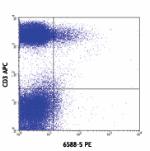
Human peripheral blood lymphocytes stained with CD3 APC and ... 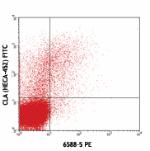
Human peripheral blood lymphocytes stained with CLA (HECA-45... -
PE anti-human CCR10

Human peripheral blood lymphocytes stained with CD3 APC and ... 
Human peripheral blood lymphocytes stained with CLA (HECA-45... -
APC anti-human CCR10
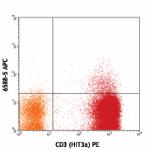
Human peripheral blood lymphocytes stained with 6588-5 APC a... -
TotalSeq™-C0815 anti-human CCR10
-
TotalSeq™-B0815 anti-human CCR10 Antibody
 Login / Register
Login / Register 









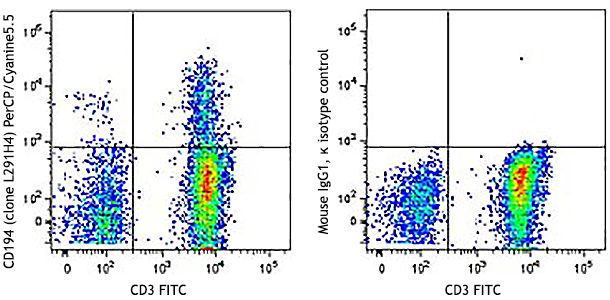
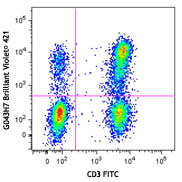
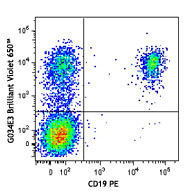
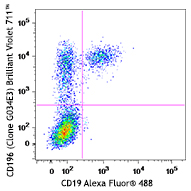



Follow Us